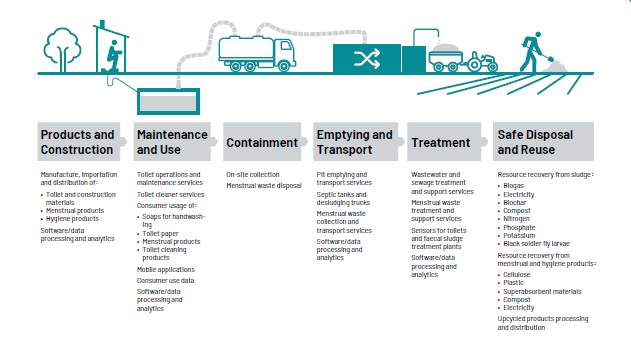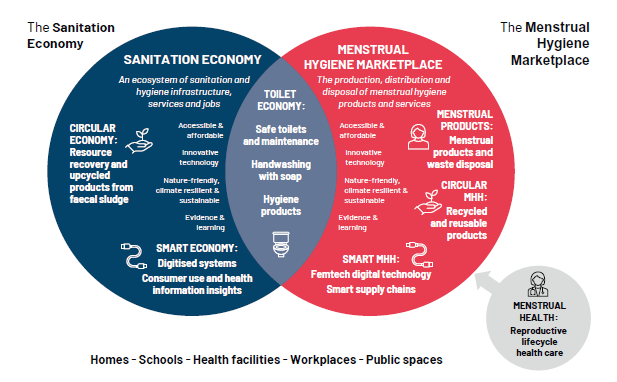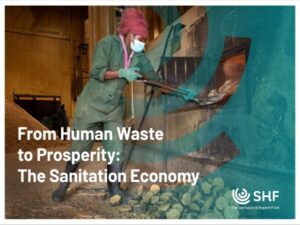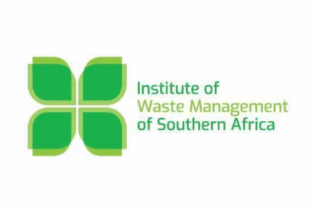Globally each day, roughly 1 043 000 tonnes of human waste is produced and more than 300 million people manage their period. This vast amount of human waste, and its safe management, has an economic value.
The Sanitation and Hygiene Fund (SHF) – through its From Human Waste to Prosperity: The Sanitation Economy Report – estimates that the current value of the sanitation economy and menstrual hygiene marketplace in Benin, Kenya, Nigeria, Sierra Leone and Uganda could exceed billions of dollars.


This market is still nascent in many countries but an increasing number of companies are tapping into this potential. The evidence for a growing need – and demand – for toilet emptying services is especially strong, translating into circular sanitation economy investment opportunities in the construction of faecal sludge treatment facilities and the manufacturing of products such as fuel pellets and briquettes, and fertilizer, with broad societal benefits including economic growth and reducing sanitation’s environmental footprint.
The smart sanitation economy The smart sanitation economy includes the digitized sanitation and hygiene systems that optimize data for operating efficiencies, maintenance, plus consumer use and health information insights. Whilst this is a small economy in many countries, there is significant and increasing potential around smartphone mobile applications, smart payment schemes and real time facility monitoring. Among the countries featured in this report, the smart sanitation economy’s market potential ranges from US$15.6 million in Sierra Leone and US$24.5 million in Nigeria. Menstrual hygiene marketplace The menstrual hygiene marketplace provides access to products and services, including circular and smart menstrual hygiene solutions. This covers reusable and disposable menstrual products, the recycling and reuse of menstrual materials, and smart supply chains that extend reach as well as digital solutions such as tracking apps. In a world in which an estimated 1 in 4 menstruators are unable to manage their period safely, there is a huge market potential for affordable menstrual hygiene products of choice. As product access increases, there also is increasing need – and demand for – solutions that reduce the environmental impact of single-use menstrual products in favour of environmental and climate-smart options. In the featured countries, the estimated current total value of the menstrual hygiene marketplace ranges from USD$4 million in Sierra Leone to US$371.2 million in Nigeria. It is expected to reach US$3 billion in the five countries combined once universal access has been achieved. Dominated by the production and sale of menstrual products, estimates for the menstrual product market range from US$4 million in Sierra Leone to US$370.9 million in Nigeria in 2022, with the potential to drastically increase to US$ 2.2 million in Sierra Leone and US$1.76 billion in Nigeria once universal access has been achieved. The circular menstrual health hygiene (MHH) market has the potential to reach US$0.7 million in Sierra Leone and US$17.7 million in Nigeria, and the smart MHH market has the potential to reach US$0.2 million in Sierra Leone and US$ 5.7 million in Nigeria. Conclusion Sanitation economies – comprising the toilet economy, the circular sanitation economy, the smart sanitation economy – and the menstrual hygiene marketplace could unlock close to a potential US$22 billion in economic gain, job creation, women’s empowerment and environmental protection by 2030 in Benin, Kenya, Nigeria, Sierra Leone and Uganda alone. Working globally and with an initial footprint in Africa, SHF is mobilising resources to develop and fund a pipeline of investable propositions to create sustainable sanitation economies and menstrual hygiene marketplaces in low and lower middle income countries. Download the From Human Waste to Prosperity: The Sanitation Economy Report here.






